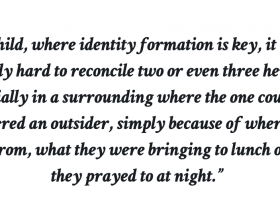I am writing this and you will understand what it says. That is, of course, if you know how to speak and read English. I am writing this and I am fully aware that the words I pick have specific connotations. That they can be very simple, unimpressive; complex or eye-opening. I am fully aware that these symbols that we have named (the irony) letters have a meaning. That that meaning in its origin was completely arbitrary, for a circle, O, did not make the sound /o/ until we (insert a certain community or maybe some individual, I don’t know, at some point in time) decided it did; that it still doesn’t make that sound in Spanish, for our /o/, despite being transcribed in the same way is essentially different.
Reading and speaking are tasks we learn to do (if we’re lucky) without really questioning the difficulty of them or the process behind them. We, or at least I did until 30 minutes ago, intuitively see both as products of repetition and practice. In a way they are: in learning how to read, human beings rely on phonemic awareness, or the understanding that words are made up of sounds, phenomenes, which, when combined in a particular order, give meaning and sense to the term. Phenomenes, in turn, are represented by either single or combined letters, which we learn to couple together through a process of association of two of our most important senses, sight and hearing. Naturally, for a word to be recognized as such (at least outside the context of a text), the reader has to have previously encountered it, to know that that word owns a meaning. Imagine an English speaker, maybe a child, who’s never heard of or encountered German before. Upon reading (or trying to) the word Fensterbrett she decides it’s just gibberish: it doesn’t mean anything, it’s a random combination of sounds. Ergo, phenomenes in themselves are not enough; we have to be aware of the meaning they comprise.
In some cases, the meaning is straightforward. Objects, animals, nature, buildings. The meaning owned by the combination of phenomenes in these cases is not subject of discussion, not hard to define. In existing in a tangible way in the world, the phenomenes representing them come to embody the mental image(s) associated to them. Cat. House. Table. Sky.
Picturing the elements I just listed was probably not hard for the reader. Now, take sadness. Well, I can picture a child crying, you may say. Yet, research into the field of emotional and behavioral psychology suggests that the traditional expressions that we associate to basic emotions (sadness, happiness, anger, surprise, disgust, fear) do not correlate to the real facial expressions displayed by agents when encountering them. Crying and turning one’s ‘smile upside down’, for instance, is a facial gesture we have been (in some cultures) collectively taught to associate to sadness in order to understand it better. When it comes to abstract terms, like emotions, adjectives and adverbs, ideological terminology, etc., meaningful combinations of phenomenes simply lack a solid entity with which they can be identified. Take if you will, Plato’s Theory of Forms (brief philosophical ramble, I promise). While there definitely is no perfect cat after which all cats are imperfectly modeled, we could take the Platonic argument to distill what I roughly pointed at above: our understanding of what cat means, is based on the image from our experiences encountering cats. Leaving the differences in physicality aside, this appears to apply to all abstract terms as well: we believe to know what happiness, tallness, socialism are from having experienced or encountered them. Language, thus, is not only a basic mathematical equation of sounds, but requires an added synthesis of the Platonic ideal.
Experiences and encounters as we know them are no match to those described by Platonic theory: they do not take place in some higher plane of existence, they are intrinsically sensory. They occur within the context of a (global) society. Experiences and encounters also happen to be directly individualistic. Even in situations in which we find ourselves with someone else when we first visit a place or meet someone, the private nature of emotional analysis– the fact that our train of thought belongs exclusively to us, that our emotions can never be felt by anyone else, even if we attempt to describe them– means that the overall experience, the impact it has on our psyche, will be unique to us. In introducing the perfect forms, Plato did not seem to introduce this nuance: the process by which our souls encountered the forms appears to be universal, for the encounters in themselves were not necessarily about emotion, but about knowledge.
When it comes to language and meaning, we appear to have come to assume that this is the case as well. The way in which reading and speaking are taught focus on knowledge of the terminology, of pronunciation. In a similar way to the perfection embodied by Platonic forms, combinations of phenomenes have, in their definitions, been enshrined as the emotionless perfection unattainable by what they actually represent. We have accepted, or never questioned, the premise that meaning works like some sort of cube: the nuances we recognize when analyzing the most abstract of concepts are there, they are the different sides of the cube, some of us see them, some of us don’t. But the cube (of meaning) in itself can be seen by everyone, it can be passed around and caught by others. The cube doesn’t change depending on who throws it, on who’s standing between the two people playing. The cube is an emotionless entity, so while it’s speed may change and some will find it harder to produce a good pass than others, the cube will be the same. It will be a cube, with its six sides, its edges, its corners.
Meaning is not such a cube, because meaning is not emotionless.
The above-described connection between encounter and emotion when referring to the private nature of our emotional analysis, and the uniqueness in experience that it produces, is not a one-time occurrence when it comes to meaning. Our understanding of terms stems from the memories we have linked to them, from the emotional reactions that those memories, in turn, spur, from our position in a world where a day will not go past without reminding us of the lack of equality. These meanings that we believe to share universally, are not there, because their essential character, the reason why we choose specific terms, is undeniably and irreparably individual. It is private, it is generally unshareable.
“When I say “love” – the sound comes out of my mouth and it hits the other person’s ear, travels through this byzantine conduit in their brain, through their memories of love or lack of love, and they register what I’m saying… and they say yes they understand, but how do I know? Because words are inert. They’re just symbols. They’re dead – you know? And so much of our experience is intangible. So much of what we perceive cannot be expressed, it’s unspeakable. And yet, you know, when we communicate with one another and we feel that we have connected – and we think we’re understood, I think we have a feeling of almost spiritual communion… and that feeling may be transient, but I think it’s what we live for.”
When I watched Waking Life the similarity of the above speech by Kim Krizan to something I think about quite regularly, surprised me. It surprised me, but mainly disappointed me: the inability of a deeply philosophical (and weird) film to meet my pessimism still feels underwhelming. I don’t think Krizan is right; I don’t think the feeling of connection, however brief, is based on understanding. Maybe there exists some other kind of connection, maybe (please don’t quote me on this) it’s even spiritual, based on some connection of ideas, bigger or better than ourselves. Maybe that feeling of almost spiritual communion was there when I met some of my closest ever friends. Still, I don’t think genuine understanding is possible.
We don’t understand (I do apologize for the repetitiveness of my vocabulary) emotions in themselves, not only those of others (read the first example right at the beginning of this article) but even those of ourselves. How many times have you told someone I’m sad, I just don’t know why? How many times has something upset you or angered you and you haven’t been able to find out why? How could you describe the feeling of the Sun warming up your legs when happiness also happens to be drinking a coffee in Pret?
We navigate this world trying to work out the inner workings of our minds while hiding that process from everyone else. We construct dialogues around a terminology we believe to be clear but that comprises a completely different sensory pack for the receiving end. We change our language depending on who we speak to, who is there, sometimes unwillingly without even noticing. We believe we all throw around cubes when the number of 3D shapes flying around is infinite.
Communication is one of the essential human characteristics; it makes us social animals, it has enabled progress, it responds to the universal need to know that we are not alone. To convince ourselves that the questions and meanings implicit to the nature of the universe do not only affect us, that we can turn to others for empathy, for support. Yes, maybe we can communicate what a cat is effectively, maybe we’ve learnt how to discuss coding, maybe we’re getting better at being open about mental health. The emotional nuances, however, the individuality that breeds our persistent and chronic loneliness, that I don’t think that can be overcome: just like a t-shirt will never look the same on two different people, the internal dialogue will never convey its essence when projected onto someone else.
This analysis of meaning explains many other phenomena that may not seem that dramatic at first, like miscommunication at some levels, breakups and romantic disappointments (how can he say he loves me, how can she believe this to be love), the difficulty of reading poetry, the weight of slurs (how does he not understand why the n-word is wrong, how does he not understand how offensive it is), the power of lyrics. It explains advertisements, insults and jokes. Maybe other factors do as well– definitely, other factors do as well– but the complexity of the nature of meaning plays a part that we cannot overlook or control. Because, at the end of the day, discussing the loneliness of meaning is futile. In a world where being alone is both the worst crime and the worst punishment, the situation to avoid at all costs, accepting the loneliness comprised by language, really letting it sink in and affect how we see all of our interactions, would probably collectively drive us to desperation. Taking it to the extreme– no one really understands you, no one ever will– renders a life that can already seem a bit useless completely pointless.
Let us think back at Krizan; she must have been right all along. Let us continue living in a world along with 7.7 billion other people. Let us have conversations and not question how genuinely fruitful they are. Let us keep the void of meaninglessness to ourselves. We can pretend that language is just one other thing that works just alright.
So, go on, what were you saying? I swear I really get what you mean.
art by Quinn Fagersten




